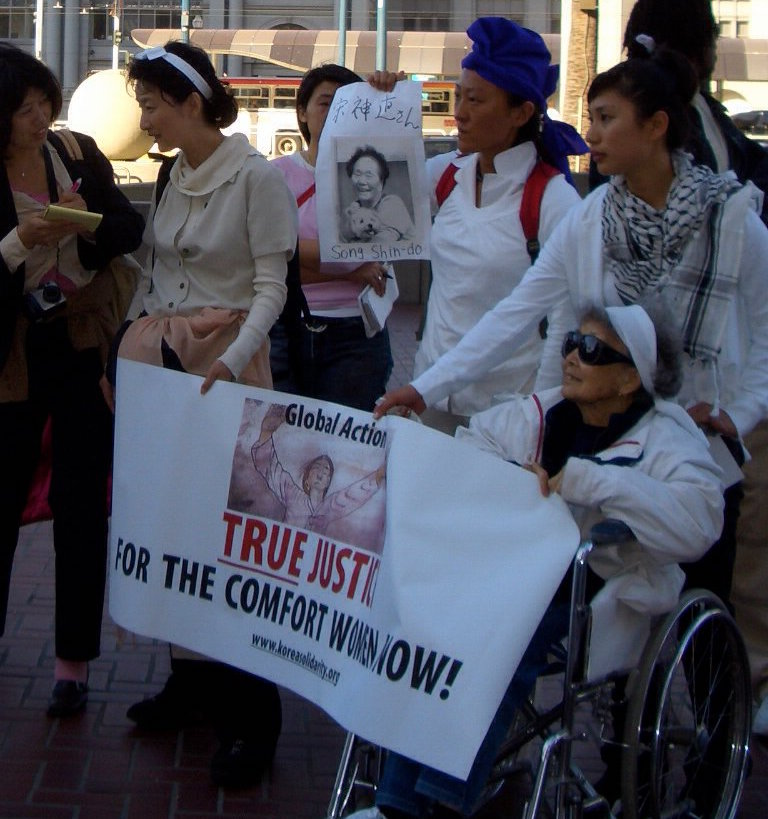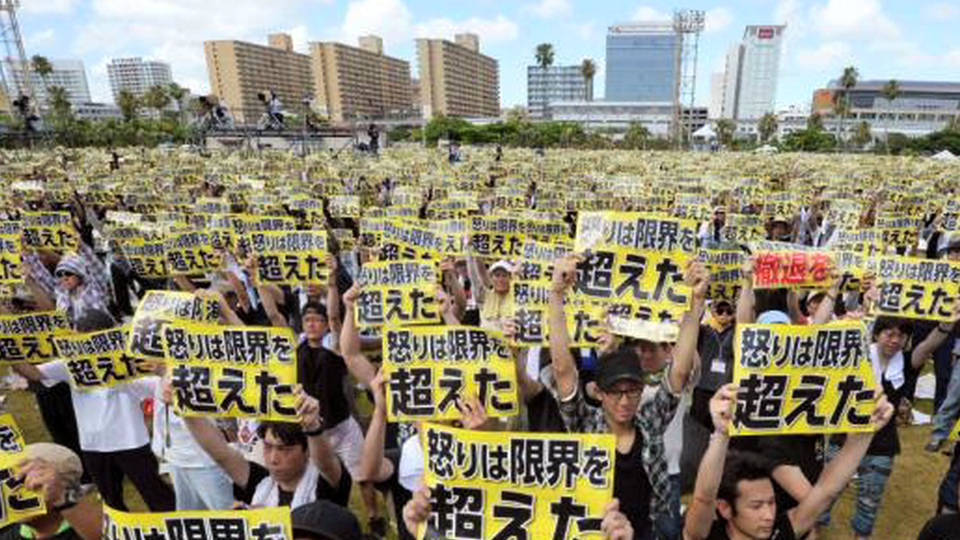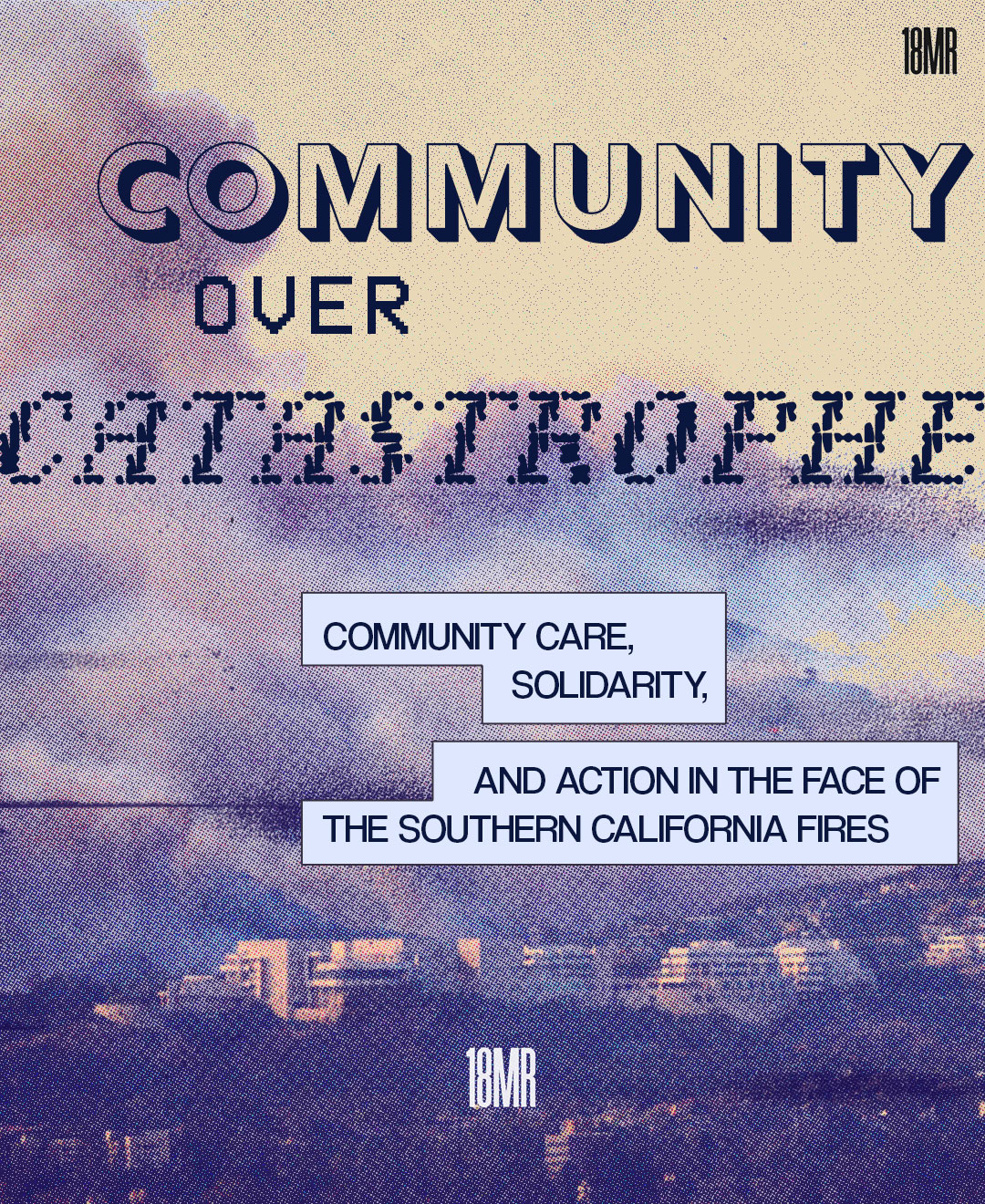
Image: The author (center) holds an image of Zainichi Korean “Comfort Woman” survivor Song Shing-do halmoni, with Yuri Kochiyama (bottom right) at a 2005 protest in front of the Japanese Consulate in San Francisco. Also pictured: renowned Zainichi human rights activist Shin Sugok and Zainichi scholar of Ethnic Studies Kyunghee Ha.
The term “Comfort Women” is a euphemism for the young women and girls forced into the military prostitution system that Japan established and administered during World War II. Japan took approximately 400,0001young women and girls as young as thirteen, with the majority of them from Korea, China, the Philippines, and Indonesia (then Dutch East Indies), and forced them into sexual servitude for Japanese soldiers throughout the Pacific theater. These women “served” anywhere from 5-60 soldiers a day, resulting in an estimated fatality rate of up to 90%, compared to 27% of front line Japanese combatant soldiers.2
The “Comfort Women” system is “considered unprecedented in its cruelty and magnitude,” according to a bipartisan resolution passed unanimously by the U.S. House of Representatives in 2007 to call for formal acknowledgement and responsibility from Japan for perpetrating “one of the largest cases of human trafficking in the 20th century.”
A global campaign demanding justice and reparations for former “Comfort Women” of the Japanese military has grown ever since the existence of Imperial Japan’s military sexual slavery system came to light in the early 1990s, when silence was broken by former “Comfort Woman” Kim Hak-Sun of South Korea. But for just as long, the conservative ruling elites of Japan have conspired to discredit and silence former “Comfort Women.” The grandson of Japan’s first postwar Prime Minister Nobusuke Kishi (who was arrested on suspicion of being a War Criminal, though never convicted), Prime Minister Shinzo Abe’s denialism and nationalism is seen as a revival of his family’s unfulfilled wartime aspirations to become a global imperial superpower. While a subculture of denialism and imperial nostalgia has long thrived among Japan’s far right in the margins of Japanese politics, Abe has made the denialist version of its history an official government policy. Today, the notion that the history of the Nanjing Massacre and “Comfort Women” is nothing more than a falsified scheme by China and Korea to undermine Japan is, as bizarre as it sounds, actually “mainstream” throughout Japan. Emboldened, Abe administration has launched a massive global PR campaign to “correct” the world’s understanding of Japan’s history. Hence, “Comfort Women” denialism has come stateside, hitting home for Asians and Asian Americans across the diaspora.
In 2015, the Japanese government requested authors and publishers of U.S. history textbooks to revise (or entirely remove) passages on “Comfort Women.” Such incidents prompted strongly worded statements condemning the attempted “suppression” of the history of Imperial Japan’s sexual slavery, by prominent historians of the American Historical Association as well as by members of the Association for Asian Studies. “It’s an insult to historians and the very scholarship founded on principles of historical inquiry,” says Eric Pido, an Asian American Studies professor at San Francisco State University, who worked with a pan-ethnic group of Asian American scholars and submitted a draft resolution “Standing with the ‘Comfort Women’: Resisters and Survivors of Japanese Historical Denialism” to the Board of the Association for Asian American Studies (AAAS). At the United Nations, various human rights bodies have unequivocally called upon Japan to remedy this issue and carry out its responsibility to educate the public rather than obscure or deny its history.
Japan’s denialism is an unforgivable insult to the dignity of victims of Japan’s colonial aggression. But the “Comfort Women” issue also intersects with U.S. military and economic interests in the Asia-Pacific region. Those concerned with U.S. militarism in Asia, dangerous “free trade” agreements, and economic imperialism abroad must see the role that U.S. complicity in Japan’s denialism plays in American geopolitical strategy.
The U.S.’s “pivot to Asia” policy seeks to “contain” the regional and global power of rival China, and “reinforce its military foothold” in the region. Also central to this strategy is the Trans-Pacific Partnership, a free trade deal between the U.S. and every major economy in the Pacific Rim except China. Such U.S. strategies have already intensified geopolitical tensions reminiscent of the Cold War. Fueled by rhetoric about the dangers of “rising” China and “rogue” North Korea, U.S. interests in Asia have even favored a reinterpretation (or, as experts and most Japanese see it, violation) of Japan’s “Peace Constitution” to allow for an expansion of Japanese military power that would enable the U.S. ally to foot more of the bill in fighting foreign wars for U.S. interests. The pivot to Asia has already exacerbated the severe burden of U.S. militarization throughout the region, pushing communities of Okinawa, and the whole of the Philippines, among others, against an even steeper uphill battle against U.S. military occupation and the economic, environmental, and gendered violence that comes with it.
But Asian and Asian American activists and allies continue to leverage trans-Pacific solidarity to resist U.S. militarism. Here in California last October, through the dedicated efforts of Okinawan community activists and allies, Berkeley City Council became the first municipality in the U.S. to adopt a resolution standing with Okinawa in opposing the construction of a new U.S. base. Across the Pacific, 65,000 people rallied last week in Okinawa to demand the ouster of U.S. military bases, prompted by the alleged rape and murder of a young Japanese woman by a U.S. military contractor.

However, grassroots peace activists aren’t the only forces hindering U.S. attempts to consolidate power amongst its Pacific Rim allies. The “Comfort Women” issue is one of several decades-old unresolved wartime sticking points between Korea and Japan, undermining U.S. efforts to fortify U.S.-Korea-Japan military cooperation as a key pillar of the U.S.’s pivot to Asia. Every time Abe or other Japanese politicians undermine or flat-out deny its WWII crimes against its neighbors, Korea strikes back, reviving resentment and suspicion that exposes the ongoing political volatility in the region, despite the supposedly peaceful “post-war” era it has entered.
But the U.S. has not shied away from choosing sides in service to its policy agenda. In fact, senior U.S. diplomats have actively participated in Japan’s historical revisionism. The U.S. has carefully stewarded a bilateral agreement struck between South Korea and Japan in December 2015, lauded as a “final and irrevocable” settlement of the long-standing “Comfort Women” issue. Six months later, the terms of this agreement, initially hailed by leaders and pundits around the world, have yet to be implemented. Eclipse Rising, a U.S.-based Zainichi Korean (descendants of Korean colonial subjects of the Japanese empire born and raised in Japan today) social justice organization, called the “agreement” an “unjust silencing of the victims…and turns its back on the fundamental understanding of women’s rights as human rights.” The agreement prohibits Korea from ever again raising the issue of “Comfort Women” in international forums, robbing Korean victims of a legitimate international platform. In addition, though English language press widely described Japan’s payment of $8.3 million as “compensation,” Foreign Minister Kishida has insisted to the Japanese media it is simply “a Korea-Japan joint venture” investment, reducing this payment to mere hush money and evading the culpability connoted by “compensation.” This so-called settlement also leaves out any requirement on the part of Japan for ongoing documentation and education of Japan’s responsibility for its sexual slavery system. Is it not clear, then, that the only thing final and irrevocable in the agreement may be the banishment of “Comfort Women” from history?
U.S. officials have gone so far as to urge Korean Americans to stay quiet on the failings of the U.S.-brokered settlement. In an interview with the Japan’s national broadcaster NHK TV, U.S. Deputy Secretary of State Antony Blinken “called on Korean-American civic groups to support” the deal — immediately drawing the ire of Korean Americans and other “Comfort Women” advocates across the country. Curiously enough, Blinken’s comments do not align with the spirit of HR 121 that the U.S Congress adopted unanimously back in 2007.
HR 121 states that Japan should “educate current and future generations about this horrible crime,” echoing similar recommendations from the international community. But Blinken’s comments expose that at the end of the day, the U.S. will treat the movement for justice for “Comfort Women” as an obstruction of its interests. U.S. foreign policy in Asia that merely provides lip service to “Comfort Women” in order to advance its pivot to Asia strategy is not likely to listen to the ordinary people — and impoverished girls and women, as were most “Comfort Women” — of Okinawa, Philippines, the Pacific islands and beyond, whose very existence may stand in the way of U.S. regional interests.
But the Grandmothers are not waiting to be heard. They have broken the silence, and, in David and Goliath fashion, are standing up to their own governments, the U.S., and a world that to this day allows 20 million people to suffer in human trafficking each year. Our future generations are beneficiaries of their extraordinary activism: widespread and systematic sexual violence and rape would likely not have been established as a “crime against humanity” according to international law had it not been for the relentless advocacy by these Grandmothers, along with other women who survived wartime rape and systematic exploitation, from Yugoslavia to Rwanda and beyond. Criminalizing sexual violence as a central strategy of war for the first time in history is an extraordinary achievement. Finally, rape — at least under international law — can no longer seen as “legitimate spoils of war.”
Today, descendants of “Comfort Women” and their allies continue on the path towards truth and justice that these Grandmothers paved. At San Francisco State University, Ethnic Studies students recently engaged in hunger strikes to defend the critical discipline and preserve our communities’ own histories, on our terms. “This [Grandmother] could have been mine,” said a Chinese American student carrying a hand-written solidarity sign, referring to a Grandma Youngsoo Lee, who spoke in her class just six months earlier during her trip to the U.S. to support the “Comfort Women” memorial resolution in San Francisco. “If we can’t learn the truth, then how do we know to say ‘never again’? We demand to know our truths! Ethnic Studies now!”
San Francisco has become one of the highest-profile battlegrounds for Japanese historical denialists as the city adopted a resolution to support memorialization of “Comfort Women” and all victims of sex trafficking in September 2015. The Comfort Women Justice Coalition (CWJC) was established with great urgency soon after the resolution was introduced by Rep. Eric Mar. The intense lobbying efforts of historical denialists throughout the Bay Area sought to derail this resolution while preaching the “real truth” to save us from Chinese and Korean propaganda to “bash Japan.” The denialists, while appearing to be local constituents, were mostly from Japan, flown in from out of town or state, and claimed that Grandmothers are “liars” and “mere prostitutes” during public hearings — insults hurled directly at Grandmother Youngsoo Lee by Koichi Mera, a former USC professor and leading Japanese denialist. An onslaught of misinformation, consistent with the Abe regime’s narrative, brewed great confusion and tension within the local Asian American community.
CWJC therefore strives to be a “liberation zone” from competing nationalisms, grounded in pan-ethnic/racial and transnational solidarity. By creating spaces for healing, progress, and resistance, CWJC seeks to end Grandmothers’ ongoing suffering by the Japanese military sexual slavery system. Though the system ceased to exist seven decades ago, we know that as Navi Pillay, former U.N. High Commissioner for Human Rights has stated, “human rights violations against these women continue to occur as long as their rights to justice and reparation are not realized.”
Teaching “Comfort Women” history in our schools and erecting Comfort Women memorials all serve the long-term purpose of remembrance — itself a subversive act of resistance.
As Michael James, a Bay Area popular education trainer once said, “if you don’t tell your own histories, then someone else who can will tell it for you.” So, let us fight for the right to remember our beautiful and enduring legacy of suffering, courage, survival and joy, which serves as a reservoir of strength to inform our cultural identities and visions for the world. In this light, “Comfort Women” are emissaries from the future, hailing to remind us all that that which we don’t fight for, we relinquish, and that we have the power to choose which path we pave for the next generation. Grandmothers’ messages are a clarion call to counter all forms of militarism, imperialism, and state-sanctioned violence against women — from Japan’s historical atrocities to the U.S.’s emerging pivot to Asia — with a force of our own: remembrance, resistance, and transnational solidarity.

Miho Kim Lee is co-convenor and coordinator of the Comfort Women Justice Coalition and founding member of Eclipse Rising. She is currently co-editing an anthology on Asian Americans remembering “Comfort Women.” As a Zainichi Korean, a survivor of Japan’s colonial policies of forced assimilation, she found home in the Bay Area almost two decades ago. Since, she has partnered with oppressed communities to advance political, cultural and spiritual strategies for liberation and cultural sovereignty through grassroots organizing, community-led research, campaign support and trainings.
1 – The numbers are highly contested; however, more recent study by Peipei Qiu of Vassar College has revealed that a heretofore unaccounted 200,000 girls and women were taken into the system from China alone. Qiu, Peipei, Zhiliang, Su, and Lifei, Chen. Chinese Comfort Women: Testimonies from Imperial Japan’s Sex Slaves, Vancouver, CA: UBC Press, 2014, p. 6.
2 – “Investigations into the fate of Korean comfort women suggests that 75 to 90 percent of them became war casualties. The casualty rate for Chinese comfort women is likely even higher.” Ibid, p. 73.








